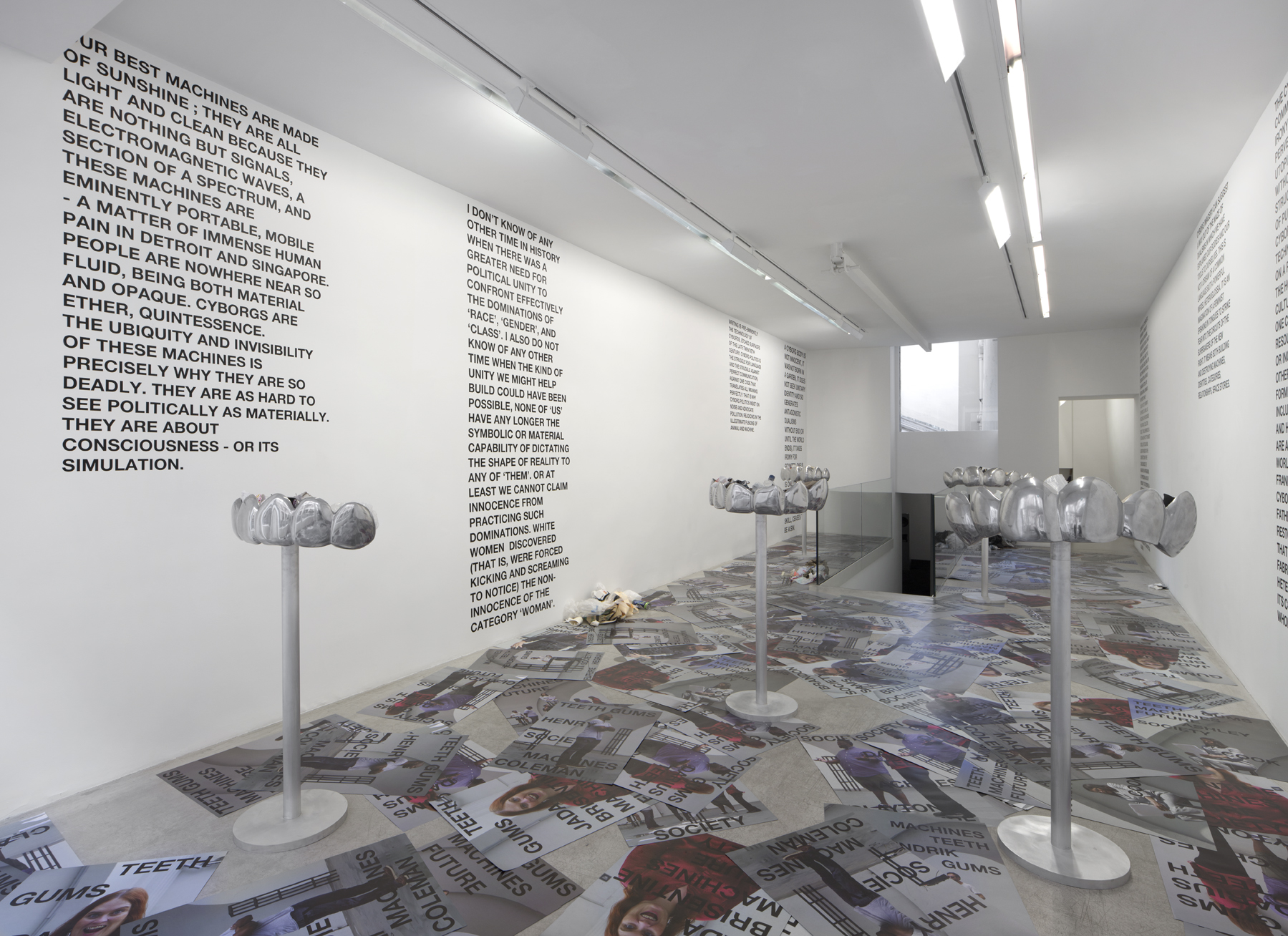
Lili Reynaud-Dewar. TEETH, GUMS, MACHINES, FUTURE, SOCIETY (trash cans), 2016. Aluminum; 110 x 25 x 71 cm. View of the exhibition Dents, gencives, machines, futur, société, kamel mennour, Paris, 2016. © Lili Reynaud-Dewar. Photo: Julie Joubert & archives kamel mennour. Courtesy of the artist and kamel mennour, Paris/London.
Memphis, Tennessee provides the setting for French-artist Lili Reynaud-Dewar’s most recent body of work, Teeth Gums Machines Future Society (2016), begun in 2009 during a residency. Set against a techno-futurist horizon, the installation, video, and performance triangulate, with desired irresolution, the city’s rich history of civil rights and labor struggles, its musical legacy, Donna Haraway’s 1985 essay “Cyborg Manifesto,” and the grills, or teeth coverings, that rose to prominence in the ‘80s and took off in the hip-hop and rap community in the South in the mid-2000s.
In the downstairs gallery, a video constitutes the centerpiece of the exhibition and features shots of the urban landscape, one-on-one interviews between the artist and four local stand-up comedians, group discussions, and a performance and reading of Haraway’s text that took place in Memphis’ futuristic Levitt Shell amphitheater, where Elvis gave his first concert. In the interviews, the camera crops tightly around the performers’ mouths, highlighting their gold- and silver-plated, custom-made grills. The grill emerges as a futuristic prosthesis placed upon the only visible part of the skeleton: the teeth. For Reynaud-Dewar, teeth constitute an interface, a threshold between public and private spaces of appearance. The grill becomes a manifestation—albeit tenuous—of the theoretical framing of the exhibition around Haraway’s seminal techno-feminist manifesto, which argues for the cyborg as a figure transcending gender, race, and class distinctions and holding emancipatory social potential.
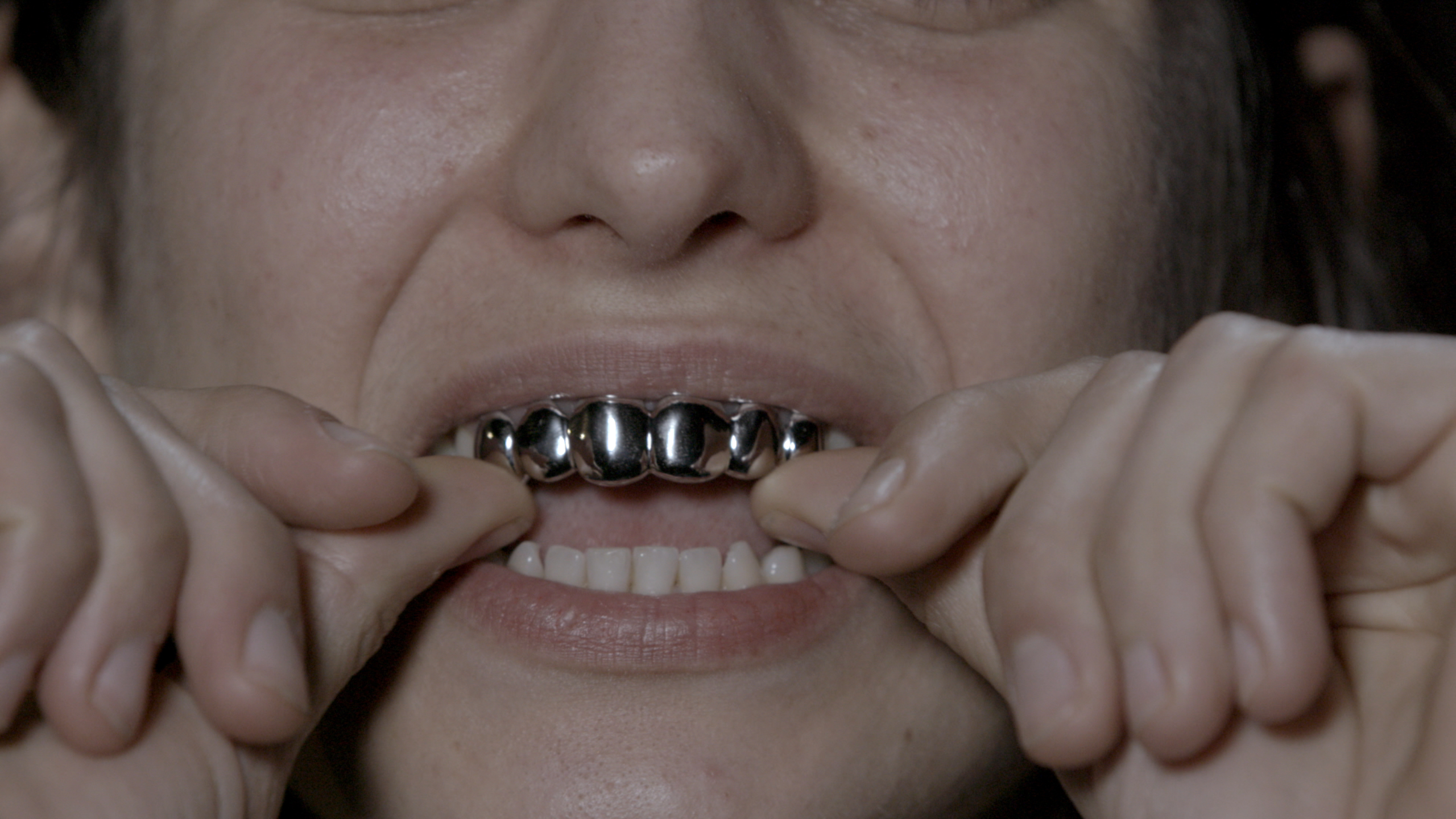
Lili Reynaud-Dewar. TEETH, GUMS, MACHINES, FUTURE, SOCIETY (Still), 2016. Video (HD, color, 5.1 sound), sound system, painted wood screen, pouffes, black carpet; variable dimensions. With the support of the Fondation d’entreprise Hermès and the FNAGP. © Lili Reynaud-Dewar. Photo: Julie Joubert & archives kamel mennour. Courtesy of the artist and kamel mennour, Paris/London.
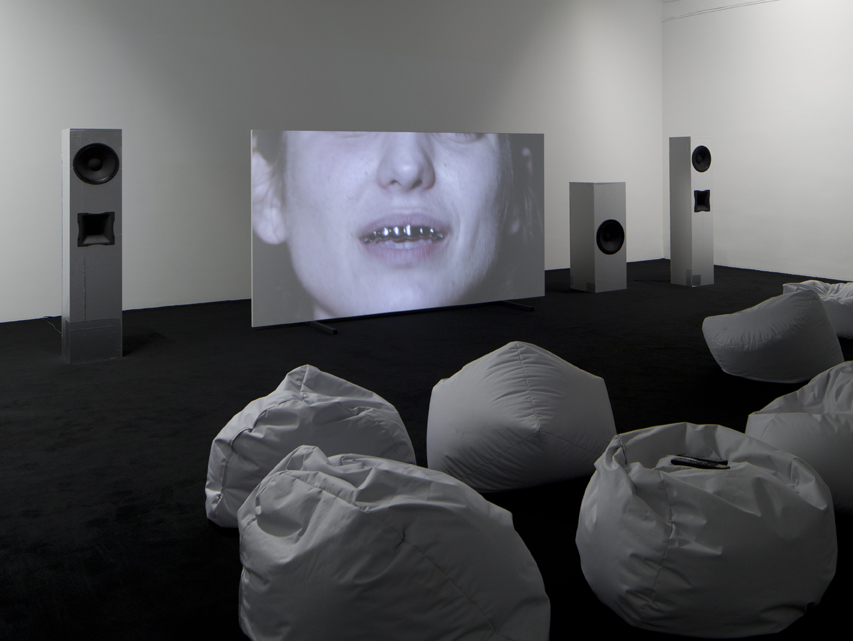
Lili Reynaud-Dewar. TEETH, GUMS, MACHINES, FUTURE, SOCIETY (Installation), 2016. Video (HD, color, 5.1 sound), sound system, painted wood screen, pouffes, black carpet; variable dimensions. With the support of the Fondation d’entreprise Hermès and the FNAGP. View of the exhibition Dents, gencives, machines, futur, société, kamel mennour, Paris, 2016. © Lili Reynaud-Dewar. Photo: Julie Joubert & archives kamel mennour. Courtesy of the artist and kamel mennour, Paris/London.
But the performers she speaks to are quick to verbalize concerns about the mobilization of this symbol, displaying their discomfort with or rejection of the cultural appropriation inherent in the slippage of signs. To Reynaud-Dewar’s question of whether grills could lend themselves to another meaning, one comedian responds that it cannot be abstracted from its significance in rap and hip-hop culture: “No, it’s too coded…it’s used by the world but it belongs to black people, and you cannot take that away from us.” An almost easy assimilation on the grounds of aesthetics—of the metallic sheen of the grill and the techno-futurist aesthetic of the cyborg—is repeatedly put to the test.
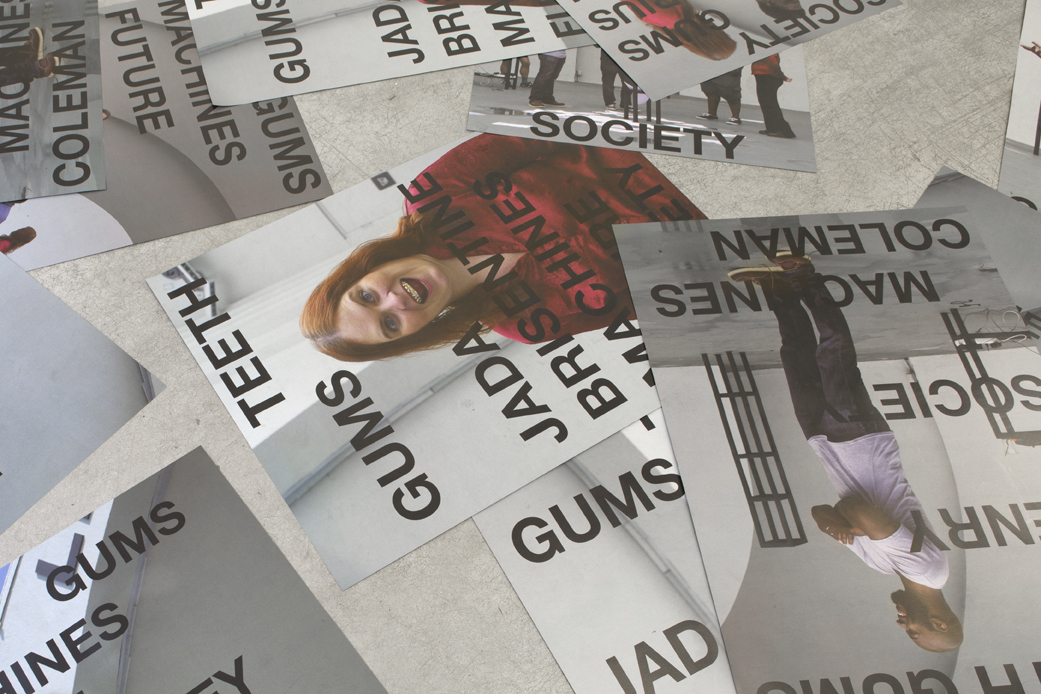
Lili Reynaud-Dewar. View of the exhibition Dents, gencives, machines, futur, société, kamel mennour, Paris, 2016. © Lili Reynaud-Dewar. Photo: Julie Joubert & archives kamel mennour. Courtesy of the artist and kamel mennour, Paris/London
What emerges from the performers’ shared dialogue, however, is a potent set of reflections, connecting the continued urgency of civil rights struggles today to the history of Memphis, and to key issues about race and appropriation, police violence, and survival strategies in the face of race and gender discrimination. From the 1968 Sanitation Workers Strike, where over 1,300 strikers walked out demanding improved working conditions and carrying now-iconic “I AM A MAN!” posters, to the assassination of Martin Luther King, Jr. only a few months later, the legacy of the city and the ghosts of its past loom large.
One performer notes: “What Memphis has that is unique, is failure.” The dual metaphor of waste—of both political potential and literal trash—ties the work together. In the upstairs gallery, trash sits in clusters on the floor or stuffed into oversized grills that act as sculptural garbage containers. The floor is otherwise littered with posters of the filmed performance, while on the walls, excerpts from Haraway’s text are prominently displayed. Reynaud-Dewar’s installation offers physicality to the visual excess echoed in the film, where performers conspicuously loiter on the streets, making visible the detritus of a society of consumption, usually rendered invisible by the city’s sanitation workers.
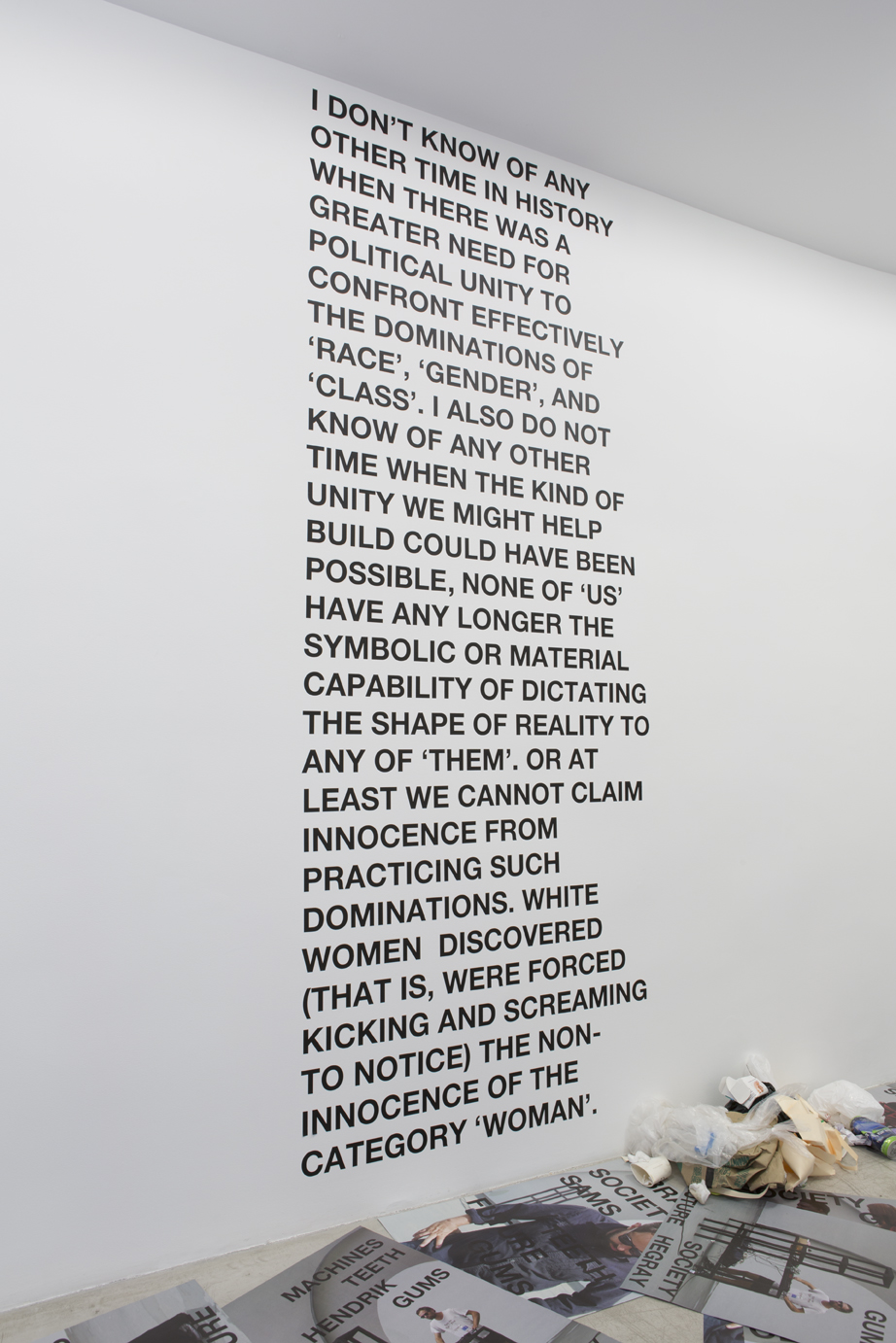
Lili Reynaud-Dewar. View of the exhibition Dents, gencives, machines, futur, société, kamel mennour, Paris, 2016. © Lili Reynaud-Dewar. Photo: Julie Joubert & archives kamel mennour. Courtesy the artist and kamel mennour, Paris/London.
A more-than-coincidental constellation of concepts and objects, Teeth Gums Machines Future Society, nimbly works within these entanglements, not to untangle them, but rather—through the chorus of voices Reynaud-Dewar assembles—to track the sites where they overlap and interface today, when the future seems less utopian than ever.
Teeth Gums Machines Future Society was on view at kamel mennour, Paris from December 8, 2016—January 14, 2017. A performance in conjunction with the exhibition was presented on December 10 and 11, 2016 at the Théâtre Nanterre-Amandiers. Teeth Gums Machines Future Society is on view at the Museion in Bolzano, Italy through May 7th, 2017.



